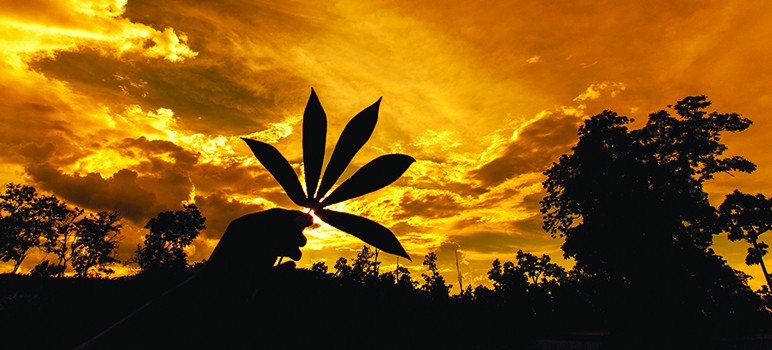Pollsters were right about Proposition 64. Two decades after legalizing medicinal cannabis, California voters on Tuesday approved its recreational use. The initiative, which garnered 55.6 percent of the vote by press time, was one of nine weed-related measures throughout the nation and one of three to pass recreational use.
“This is a titanic shift in U.S. drug policy,” San Jose-based pot lobbyist Sean Kali-Rai said. “I think it will help get rid of those last vestiges of stigma attached to medical marijuana, or marijuana in general.”
Most Americans say they’re already on board with lifting the prohibition on recreational use. A recent Gallup Poll found that public support of legalization reached 60 percent nationwide—pot’s highest approval rating in 47 years.
Sanctioning social along with therapeutic use will galvanize an already rapidly growing industry, Kali-Rai predicts. The Golden State, which boasts the sixth largest economy on the planet, already sits on a $2.7 billion cannabis industry. Expanding the market to non-medicinal use has the potential to double that, according to Prop. 64 backers.
But the most important thing about the legalization measure that won the blessing of California voters this week is how it affects people of color. The new law decriminalizes marijuana possession of up to an ounce for personal use and reinvests some of its tax proceeds back to communities that bore the brunt of racialized drug policies.
“That’s the biggest thing, that this is a major criminal justice reform,” said Kali-Rai, adding that the collectives he works with were all in for Prop. 64. “A lot of [my clients] at heart were medical marijuana activists before getting into this business. They’ve seen families torn apart, children sent to foster care, they saw lives being destroyed.”
When do the new rules go into effect? Technically, some components of the measure went into effect at midnight. As of now, anyone 21 and older can keep up to an ounce for personal use and grow up to six pot plants, as long as they’re obscured from public view.
As for alcohol, it will remain illegal for people to drive while intoxicated. You cannot technically smoke out in the open, although that has become unofficially accepted in a lot of places. Refrain from taking weed to schools, daycares or anywhere kids tend to be.
Folks under the age of 18 caught using cannabis will have to go through mandatory drug counseling and possibly have to complete a number of community service hours to make up for it. Smoking pot without a license could result in a six-month jail stay or $500 fine. Smoke it in public, pay $100. Smoke it near a school, pay $250. On the upside, people jailed for cannabis-related crimes will qualify for re-sentencing.
Aside from the new liberties for personal use, most of the same old rules apply. In San Jose, the only 16 cannabis collectives licensed to operate will still require a doctor’s recommendation and card and cannot do recreational sales yet. And it will stay that way until City Hall reworks its regulatory scheme to include non-medical marijuana.
“This is not a green light,” Kali-Rai said. “Just because it passes doesn’t mean you can start acting like an idiot.”


That’s a pretty hilarious headline.
> “This is not a green light,” Kali-Rai said. “Just because it passes doesn’t mean you can start acting like an idiot.”
PREDICTION:
Pot users WILL act like idiots.
take the stick out of your ass
Good one Ruben
Jen just a favor. If this article is going to print, can you write with a bit more emphasis that the 16 current dispensaries cannot sell recreation MJ yet? We’ve been inundated with calls from people thinking this is the case.
The medical dispensaries not being grandfathered in as recreational sellers is just wrong. I would like to hear the justification for that. Also the prices have to come down or a private green market is going to form. I couldn’t believe the prices I saw online here.
Your sense of entitlement is crazy.
“I think it will help get rid of those last vestiges of stigma attached to medical marijuana, or marijuana in general.”
Given that its use was reduced to an infraction years ago, the “stigma” connected with marijuana use is founded on how it affects, and what is says about, the user, neither of which were altered by this last election. Marijuana functions as a crutch, the need for a crutch is evidence of infirmity (no matter if that crutch is made of wood, derived from a plant, or obtained via a cult).
Damn right it’s a crutch…
And the stigma? I don’t mind it, at all. Haters gonna hate…